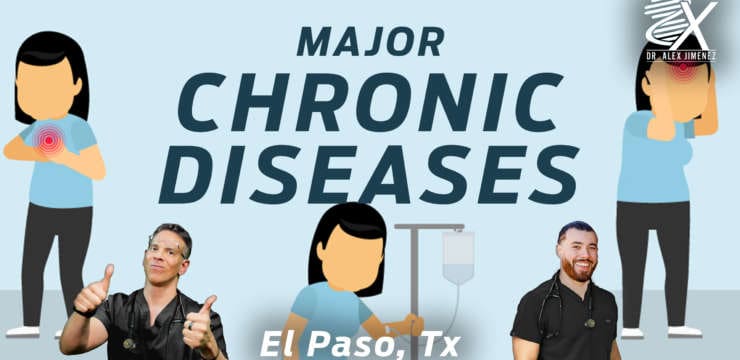
Table of Contents
Diet After Brain Injury: How Food, Supplements, and Integrative Chiropractic Care Support Healing

After a brain injury, healing is not just about rest and rehab visits. What you eat every day becomes part of your treatment plan. Nutrition affects inflammation, energy, mood, and how well the brain and nervous system repair themselves. Research shows that people with traumatic brain injury (TBI) often need more protein, healthy fats, and antioxidants than usual to support recovery. PMC+1
At the same time, care from a nurse practitioner and integrative chiropractic team—like the approach used by Dr. Alexander Jimenez, DC, APRN, FNP-BC, in El Paso—can help coordinate lab testing, supplements, spinal care, and non-surgical decompression to support the whole body during recovery. El Paso, TX Doctor Of Chiropractic+3El Paso, TX Doctor Of Chiropractic+3El Paso, TX Doctor Of Chiropractic+3
This article explains, in clear language, how diet and supplements can support brain healing and how nurse practitioners and integrative chiropractic care fit into a full recovery plan.
Why Nutrition Matters So Much After a Brain Injury
When the brain is injured, there is an immediate impact (the primary injury), followed by a secondary wave of damage caused by inflammation, oxidative stress (free radical damage), and changes in blood flow and energy use. MDPI+1
A healing-focused diet can help:
-
Fuel damaged brain cells with enough protein and healthy fats. PMC+1
-
Lower inflammation through omega-3 fats and antioxidants. PMC+2PMC+2
-
Support the gut–brain axis, which often becomes disrupted after TBI. PMC+2TBI Model System+2
-
Stabilize blood sugar levels, which help with mood, focus, and energy. Flint Rehab+1
Brain injury rehab programs and brain injury foundations commonly recommend patterns similar to the Mediterranean diet and, in some cases, a ketogenic-style diet for select patients under medical supervision. UCLA Health+3Headway+3Flint Rehab+3
Healing Diet Patterns: Mediterranean and Ketogenic Styles
Mediterranean-style eating after brain injury
A Mediterranean-style diet is not a strict “diet plan.” It is more of a pattern focused on whole, minimally processed foods:
-
Plenty of fruits and vegetables
-
Whole grains (oats, brown rice, quinoa)
-
Beans and lentils
-
Nuts and seeds
-
Olive oil as the main fat
-
Fish, especially fatty fish like salmon and sardines
-
Small amounts of poultry, eggs, and dairy
Studies suggest that Mediterranean eating can support both brain and heart health, which matters after TBI because good blood flow and reduced inflammation help the brain repair itself. EatingWell+3Headway+3Flint Rehab+3
Ketogenic-style approaches (for select patients)
Some rehab programs and clinicians also explore ketogenic-style diets—high in fat, moderate in protein, and very low in carbohydrates—to shift the brain toward using ketones as fuel. Early research and clinical reports suggest that in certain cases, ketones may help stabilize brain energy and reduce inflammation. Flint Rehab+2PMC+2
However:
-
A strict keto diet is not necessary for everyone with a brain injury.
-
It must be supervised by a qualified medical professional, especially if you have diabetes, kidney issues, or take medications. Flint Rehab+2PMC+2
Many patients do well on a more flexible Mediterranean-style pattern that still emphasizes healthy fats and limits refined carbohydrates.
Key Foods to Focus on After a Brain Injury
1. Protein: Building blocks for the brain and body
After TBI, protein requirements often increase as the body tries to repair tissues and maintain muscle mass. Expert reviews note that people with moderate to severe TBI may need higher protein intake—sometimes around 15–20% of total calories—to support healing. PMC+2TBI Model System+2
Good protein sources include:
-
Lean poultry (chicken, turkey)
-
Fish and seafood
-
Eggs
-
Greek yogurt and cottage cheese
-
Beans, lentils, and chickpeas
-
Tofu and tempeh
Adequate protein supports:
-
Brain cell repair
-
Immune function
-
Muscle strength, which helps with balance and physical rehab
2. Healthy fats and omega-3s: Protecting brain cells
The brain is nearly 60% fat by dry weight, and omega-3 fatty acids are key building blocks of brain cell membranes. Flint Rehab+2PMC+2
Foods rich in healthy fats:
-
Fatty fish: salmon, mackerel, sardines, anchovies
-
Plant omega-3s: walnuts, chia seeds, flaxseeds, hemp seeds Flint Rehab+2Zao Rehab+2
-
Olive oil for cooking and dressings
-
Avocado
Omega-3s may help:
-
Reduce brain inflammation
-
Stabilize cell membranes
-
Support mood and reduce risk of depression after TBI PMC+2PMC+2
3. Antioxidant-rich fruits and vegetables
Brain injury increases oxidative stress, leading to more free radical damage to cells. Antioxidants help neutralize this damage. Xia & He Publishing+2MDPI+2
Helpful antioxidant foods:
-
Berries (blueberries, strawberries, blackberries)
-
Dark leafy greens (spinach, kale, Swiss chard)
-
Colorful vegetables: carrots, bell peppers, beets
-
Citrus fruits: oranges, grapefruits, lemons
-
Green tea and small amounts of dark chocolate
Many guides for TBI recovery highlight berries, leafy greens, citrus, and other colorful produce as “brain foods” that support plasticity and repair. Gaylord Specialty Healthcare+4Flint Rehab+4UCLA Health+4
4. Healthy carbohydrates and fiber
Unless a strict ketogenic pattern is being used under medical supervision, complex carbohydrates still play a role in recovery:
-
Whole grains: oats, brown rice, quinoa, whole-wheat bread
-
Starchy vegetables: sweet potatoes, winter squash
-
Beans and lentils
These foods:
-
Provide steady energy
-
Support a healthy gut microbiome
-
Help prevent big blood-sugar swings that can worsen fatigue, anxiety, and brain fog TBI Model System+2Flint Rehab+2
5. Hydration and electrolytes
Brain healing demands good blood flow and fluid balance.
Focus on:
-
Water throughout the day
-
Broths and herbal teas
-
Electrolyte drinks (low in sugar) if your healthcare provider recommends them
Dehydration can worsen headaches, dizziness, and confusion, which are already common after brain injury.
Evidence-Based Supplements: Omega-3s, B Vitamins, Creatine, and Magnesium
Diet should always come first. But after a brain injury, supplements can provide targeted support—especially when guided by a nurse practitioner or other licensed clinician.
Important: Always talk with your healthcare provider before starting supplements. They can check for drug interactions, medical risks, and appropriate dosing.
Omega-3 fatty acids
-
Common supplement forms: fish oil (EPA/DHA), algae oil
-
Potential benefits:
-
Reduce brain inflammation
-
Support cell membrane repair
-
Help mood and cognitive function after TBI PMC+2PMC+2
-
Omega-3s are among the most studied nutrients in TBI literature and may help limit secondary brain injury by modulating inflammatory pathways. PMC+2PMC+2
B vitamins (especially B2, B3, B6, B12, and folate)
B vitamins play a role in energy production, nerve repair, and the reduction of oxidative stress.
Research suggests:
-
Riboflavin (B2) and niacin (B3) may help reduce oxidative damage and support functional recovery in experimental TBI models. Taylor & Francis Online+3PMC+3Xia & He Publishing+3
-
B2, B3, and B6 may help heal brain tissue and reduce oxidative stress in clinical settings for concussion and TBI. Delaware NeuroRehab+2Flint Rehab+2
Dietary sources include:
-
Eggs and dairy
-
Leafy greens
-
Whole grains
-
Organ meats (like liver, if tolerated) Delaware NeuroRehab+1
Supplements are often considered if lab tests show deficiencies or intake is low.
Creatine
Creatine is naturally stored in muscles and the brain and helps regenerate ATP, the body’s main energy molecule. After TBI, brain creatine levels may drop, which stresses brain energy systems. Gatorade Sports Science Institute+4NCBI+4Johns Hopkins University+4
Key findings:
-
Animal studies show creatine can reduce brain tissue damage after TBI and support mitochondrial function. Johns Hopkins University+1
-
Human and review data suggest creatine may help attenuate symptoms of concussion and mild TBI, improve cognitive function under stress, and support recovery. EatingWell+3MDPI+3PMC+3
Because doses for brain effects can be higher than those for general fitness, creatine should be used under professional supervision, especially if there are kidney or metabolic concerns.
Magnesium
Magnesium plays a role in nerve signaling, energy metabolism, and muscle relaxation.
-
Experimental and clinical work suggests that magnesium may help limit brain damage and support recovery after TBI, though results are mixed and dosing protocols remain under study. Xia & He Publishing+2PMC+2
-
Many people are low in magnesium due to diet, stress, or medications.
Magnesium-rich foods include:
-
Nuts and seeds
-
Dark leafy greens
-
Beans and whole grains
Some patients use magnesium supplements to support sleep, reduce muscle tension, and help with headache symptoms—but again, only under guidance.
Foods and Habits to Limit During Brain Injury Recovery
Just as some foods help, others may slow healing or worsen symptoms.
Common items to limit:
-
Sugary foods and drinks: soda, candy, pastries, sweet coffee drinks
-
Highly processed snacks: chips, fast food, packaged baked goods
-
Trans fats and highly processed oils: deep-fried foods, some fast-food items
-
Excess salt: frequent fast food, heavily salted packaged foods
-
Heavy alcohol use
TBI nutrition guides emphasize that these foods can worsen inflammation, increase blood sugar fluctuations, and intensify fatigue, mood changes, and brain fog. Gaylord Specialty Healthcare+4Flint Rehab+4Gaylord Specialty Healthcare+4
Instead of focusing on perfection, think in terms of “crowding out” unhealthy options with more nutrient-dense meals and snacks.
How a Nurse Practitioner Supports Brain-Injury Nutrition and Supplements
A nurse practitioner (NP) trained in brain injury, functional medicine, or primary care can act as a central coordinator for your recovery.
In practices like Dr. Alexander Jimenez’s integrative clinics in El Paso, nurse practitioners work together with chiropractors, nutrition professionals, and rehab specialists to create whole-person treatment plans. El Paso, TX Doctor Of Chiropractic+6El Paso, TX Doctor Of Chiropractic+6El Paso, TX Doctor Of Chiropractic+6
A nurse practitioner can help by:
-
Taking a detailed history
-
When the injury happened
-
Current symptoms (headache, dizziness, mood changes, gut problems)
-
Typical daily diet and fluid intake
-
-
Ordering and interpreting lab tests, such as:
-
Vitamin B12 and folate levels
-
Vitamin D
-
Magnesium and other minerals
-
Lipids, blood sugar, and inflammatory markers
-
-
Prescribing supplements or dietary changes when needed
-
Adjusting omega-3, B vitamins, creatine, magnesium, or other nutrients based on labs and clinical picture MDPI+3Flint Rehab+3PMC+3
-
-
Coordinating medications and supplements
-
Checking for interactions (blood thinners, seizure meds, blood pressure meds, etc.)
-
Adjusting doses as recovery progresses
-
-
Supporting the gut–brain axis
-
Recommending fiber, fermented foods, or probiotics where appropriate
-
Addressing constipation or diarrhea that can follow brain injury or pain medications PMC+2TBI Model System+2
-
-
Monitoring progress over time
-
Tracking fatigue, mood, headaches, and sleep
-
Updating the plan as you move from acute recovery to long-term healing
-
Because Dr. Jimenez holds credentials as both a Doctor of Chiropractic and a Family Nurse Practitioner, his clinical model is a strong example of how medical evaluation, lab testing, and hands-on care can be integrated in a single setting. El Paso, TX Doctor Of Chiropractic+4El Paso, TX Doctor Of Chiropractic+4El Paso, TX Doctor Of Chiropractic+4
How Integrative Chiropractic Care Supports Musculoskeletal and Nervous System Healing
Brain injury rarely affects just the brain. It often comes with:
-
Neck strain or whiplash
-
Back pain
-
Postural changes
-
Balance problems
-
Muscle tightness and joint stiffness
Integrative chiropractic care aims to restore healthy movement and support nervous system regulation while the brain heals.
In the model used at Injury Medical & Chiropractic Clinic and related centers led by Dr. Jimenez:
-
Spinal manipulation (adjustments)
-
Helps improve joint motion in the neck, mid-back, and low back
-
May reduce mechanical stress on the nervous system and surrounding muscles
-
Can ease headaches, neck pain, and postural strain that often follow TBI and motor vehicle accidents El Paso, TX Doctor Of Chiropractic+4El Paso, TX Doctor Of Chiropractic+4El Paso Back Clinic+4
-
-
Non-surgical spinal decompression
-
Gently stretches the spine to reduce pressure on discs and nerves
-
Can help with radiating arm or leg pain and nerve irritation made worse by the injury
-
-
Soft tissue therapy and neuromuscular re-education
-
Addresses muscle spasm, trigger points, and tight fascia
-
Retrains movement patterns, balance, and coordination during rehab El Paso Back Clinic+2El Paso, TX Doctor Of Chiropractic+2
-
-
Exercise, posture, and mobility training
-
Builds strength in core and postural muscles
-
Supports better balance and reduces fall risk
-
Integrates breathing, stretching, and light aerobic work to help the brain and body work together again
-
-
Lifestyle and nutrition coaching
-
Integrative chiropractic teams trained in functional medicine—like Dr. Jimenez’s—often review diet, sleep, and stress alongside spinal care, using nutrition and targeted supplements to support brain recovery. El Paso, TX Doctor Of Chiropractic+3El Paso, TX Doctor Of Chiropractic+3El Paso, TX Doctor Of Chiropractic+3
-
By addressing both mechanical stress (joints, discs, muscles) and functional stress (inflammation, toxicity, poor diet), integrative chiropractic care becomes a powerful partner to medical and rehab approaches.
Putting It All Together: A Practical Daily Approach
Every person with a brain injury is different, but here is a simple way to think about daily choices. Always adjust this with your own nurse practitioner or healthcare provider.
Aim for most meals to include:
-
A quality protein (fish, eggs, poultry, beans, Greek yogurt)
-
A healthy fat (olive oil, avocado, nuts, seeds, fatty fish)
-
Colorful fruits or vegetables (at least half of your plate)
-
A whole grain or starchy vegetable, unless on a prescribed keto-style plan
Sample day (Mediterranean-style pattern)
-
Breakfast
-
Omelet with spinach, tomatoes, and feta
-
Slice of whole-grain toast with olive oil
-
Berries on the side
-
-
Lunch
-
Lentil and vegetable soup with carrots, celery, and kale
-
Mixed green salad with olive oil and lemon
-
A handful of walnuts
-
-
Snack
-
Greek yogurt with blueberries and chia seeds
-
-
Dinner
-
Grilled salmon with herbs
-
Quinoa or brown rice
-
Roasted broccoli and red bell peppers in olive oil
-
-
Evening
-
Herbal tea and a small square of dark chocolate (70%+) if tolerated
-
Simple daily checklist
-
Eat protein at every meal
-
Include colorful vegetables or fruit at every meal
-
Use olive oil and nuts/seeds for healthy fats
-
Drink water regularly throughout the day
-
Limit sugary drinks, fast food, and processed snacks
-
Take only the supplements your clinician has recommended
-
Keep follow-up visits with your nurse practitioner and chiropractic team
Final Thoughts: A Team-Based Plan for Brain Healing
Recovery from a brain injury is rarely a straight line. Symptoms can flare with stress, lack of sleep, or changes in routine. A healing-focused diet, paired with thoughtful supplement use and integrative chiropractic care, gives the brain and body tools to handle these ups and downs.
Key takeaways:
-
Protein, healthy fats (especially omega-3s), fruits, vegetables, and antioxidants form the core of a brain-healing diet.
-
Patterns like the Mediterranean diet and, in some cases, medically supervised ketogenic approaches can support brain and nervous system recovery. Headway+3Flint Rehab+3UCLA Health+3
-
Supplements such as omega-3s, B vitamins, creatine, and magnesium show promising support for brain healing but should be used under professional guidance. Vertex PT Specialists+6PMC+6Delaware NeuroRehab+6
-
A nurse practitioner can order labs, interpret results, and personalize supplement and diet plans.
-
Integrative chiropractic care, including spinal manipulation, non-surgical decompression, soft-tissue therapy, and exercise-based rehab, supports musculoskeletal and nervous system function during TBI recovery—especially in integrative models such as those led by Dr. Alexander Jimenez in El Paso. El Paso, TX Doctor Of Chiropractic+3El Paso, TX Doctor Of Chiropractic+3El Paso Sciatica Clinic+3
Working with a coordinated team helps transform “just eating better” into a structured, science-informed recovery plan that respects your brain, your body, and your long-term quality of life.
References
Brain Injury Hope Foundation. (n.d.). Feed your brain to boost recovery. Retrieved from braininjuryhopefoundation.org
Dean, P. J. A., Arnaud, M. J., & colleagues. (2017). Potential for use of creatine supplementation following mild traumatic brain injury. Frontiers in Neurology. Retrieved from pmc.ncbi.nlm.nih.gov/articles/PMC6094347/ PMC
Deneurorehab. (2025, May 2). Best supplements for concussion and traumatic brain injury recovery. Retrieved from www.deneurorehab.com Delaware NeuroRehab
Flint Rehab. (2020, October 15). Nutrition therapy for traumatic brain injury: How it works. Retrieved from www.flintrehab.com Flint Rehab
Flint Rehab. (2022, February 3). Top 7 vitamins & supplements for traumatic brain injury. Retrieved from www.flintrehab.com Flint Rehab
Flint Rehab. (2023, January 6). 10 best foods for brain injury recovery. Retrieved from www.flintrehab.com Flint Rehab+1
Gaylord Specialty Healthcare. (2024, March 15). Nutrition to support your traumatic brain injury recovery. Retrieved from www.gaylord.org Gaylord Specialty Healthcare
Headway. (n.d.). Diet after brain injury: Healthy body, healthy mind? Retrieved from www.headway.org.uk Headway
Kumar, P. R., & colleagues. (2014). Omega-3 fatty acids could alleviate the risks of traumatic brain injury. Journal of Nutrition and Metabolism. Retrieved from pmc.ncbi.nlm.nih.gov/articles/PMC4003707/ PMC
Lee, H. Y., & colleagues. (2022). Nutrition management in patients with traumatic brain injury. Acute and Critical Care, 37(1), 1–12. Retrieved from pmc.ncbi.nlm.nih.gov/articles/PMC9833460/ PMC
Lonestar Neurology. (n.d.). Brain injury food: Best foods to eat after brain injury. Retrieved from lonestarneurology.net
Monti, K., & colleagues. (2024). The role of nutrition in mild traumatic brain injury. Nutrients. Retrieved from pmc.ncbi.nlm.nih.gov/articles/PMC11612933/ PMC
Nwafor, D., & colleagues. (2023). Nutritional support following traumatic brain injury. Exploration of Research Hypothesis in Medicine. Retrieved from www.xiahepublishing.com Xia & He Publishing
Rezilir Health. (2025, October 10). Turbocharge your brain and body with creatine. Retrieved from www.rezilirhealth.com Rezilir Health
Sullivan, P. G., Geiger, J. D., Mattson, M. P., & Scheff, S. W. (2000). Dietary supplement creatine protects against traumatic brain injury. Annals of Neurology, 48(5), 723–729. Retrieved from pure.johnshopkins.edu Johns Hopkins University
UCLA Health. (2022, March 30). Nutrition may play a key role in supporting brain health for people recovering from a TBI. Retrieved from www.uclahealth.org UCLA Health
Vonder Haar, C., & colleagues. (2015). Vitamins and nutrients as primary treatments in experimental traumatic brain injury. Neurotrauma Reports. Retrieved from pmc.ncbi.nlm.nih.gov/articles/PMC4870112/ PMC
Denniss, R. J., & colleagues. (2023). Brain trauma and the secondary cascade in humans. Behavioral Sciences, 13(5), 388. Retrieved from www.mdpi.com/2076-328X/13/5/388 MDPI
Jimenez, A. (Dr. Alex Jimenez). (2025). Nutritional guidelines: Essential foods to eat for head injuries. Retrieved from dralexjimenez.com El Paso, TX Doctor Of Chiropractic+2El Paso, TX Doctor Of Chiropractic+2
Jimenez, A. (Dr. Alex Jimenez). (n.d.). El Paso, TX Doctor of Chiropractic – Functional integrative medicine practice. Retrieved from dralexjimenez.com El Paso, TX Doctor Of Chiropractic+2El Paso, TX Doctor Of Chiropractic+2
Disclaimers
Professional Scope of Practice *
The information herein on "Diet After Brain Injury: Foods for Optimal Recovery" is not intended to replace a one-on-one relationship with a qualified health care professional or licensed physician and is not medical advice. We encourage you to make healthcare decisions based on your research and partnership with a qualified healthcare professional.
Blog Information & Scope Discussions
Welcome to El Paso's wellness blog, where Dr. Alex Jimenez, DC, FNP-C, a board-certified Family Practice Nurse Practitioner (FNP-C) and Chiropractor (DC), presents insights on how our team is dedicated to holistic healing and personalized care. Our practice aligns with evidence-based treatment protocols inspired by integrative medicine principles, similar to those found on dralexjimenez.com, focusing on restoring health naturally for patients of all ages.
Our areas of chiropractic practice include Wellness & Nutrition, Chronic Pain, Personal Injury, Auto Accident Care, Work Injuries, Back Injury, Low Back Pain, Neck Pain, Migraine Headaches, Sports Injuries, Severe Sciatica, Scoliosis, Complex Herniated Discs, Fibromyalgia, Chronic Pain, Complex Injuries, Stress Management, Functional Medicine Treatments, and in-scope care protocols.
Our information scope is limited to chiropractic, musculoskeletal, physical medicine, wellness, contributing etiological viscerosomatic disturbances within clinical presentations, associated somato-visceral reflex clinical dynamics, subluxation complexes, sensitive health issues, and functional medicine articles, topics, and discussions.
We provide and present clinical collaboration with specialists from various disciplines. Each specialist is governed by their professional scope of practice and their jurisdiction of licensure. We use functional health & wellness protocols to treat and support care for the injuries or disorders of the musculoskeletal system.
Our videos, posts, topics, subjects, and insights cover clinical matters, issues, and topics that relate to and directly or indirectly support our clinical scope of practice.*
Our office has reasonably attempted to provide supportive citations and has identified the relevant research studies or studies supporting our posts. We provide copies of supporting research studies available to regulatory boards and the public upon request.
We understand that we cover matters that require an additional explanation of how they may assist in a particular care plan or treatment protocol; therefore, to discuss the subject matter above further, please feel free to ask Dr. Alex Jimenez, DC, APRN, FNP-BC, or contact us at 915-850-0900.
We are here to help you and your family.
Blessings
Dr. Alex Jimenez DC, MSACP, APRN, FNP-BC*, CCST, IFMCP, CFMP, ATN
email: coach@elpasofunctionalmedicine.com
Licensed as a Doctor of Chiropractic (DC) in Texas & New Mexico*
Texas DC License # TX5807
New Mexico DC License # NM-DC2182
Licensed as a Registered Nurse (RN*) in Texas & Multistate
Texas RN License # 1191402
ANCC FNP-BC: Board Certified Nurse Practitioner*
Compact Status: Multi-State License: Authorized to Practice in 40 States*
Graduate with Honors: ICHS: MSN-FNP (Family Nurse Practitioner Program)
Degree Granted. Master's in Family Practice MSN Diploma (Cum Laude)
Dr. Alex Jimenez, DC, APRN, FNP-BC*, CFMP, IFMCP, ATN, CCST
My Digital Business Card






